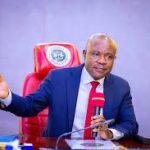By Chidi Ugwu
The Nigeria Sovereign Investment Authority (NSIA) has grown its net assets by 96% to ₦4.35 trillion as of December 2024, compared to ₦2.22 trillion in December 2023.
This is contained in the Authority’s audited financial results for the 2024 fiscal year, released on Monday in Abuja.
According to a statement, signed by Joyce Onyegbula, Head, Corporate Communications, NSIA maintained profitability for the 12th consecutive year, achieving cumulative retained earnings of ₦3.74 trillion by the end of 2024.
The result indicates that total operating profits increased by 59% from ₦1.17 trillion in 2023 to ₦1.86 trillion in 2024, driven by diversified investments, infrastructure assets, and gains from foreign exchange movements, while total Comprehensive Income (TCI) reached ₦1.89 trillion in 2024, a 59% rise from ₦1.18 trillion in 2023.
Also, Core TCI (excluding foreign exchange and derivative valuation gains) surged by 148% to ₦407.9 billion.
The results highlight the Authority’s strategic investment approach and commitment to driving long-term economic transformation in Nigeria, showcasing remarkable growth and resilience despite global economic challenges.
NSIA’s Managing Director and CEO, Mr. Aminu Umar-Sadiq, attributed the exceptional performance to disciplined execution of strategy, innovation, and sound risk management.
He emphasized the Authority’s focus on delivering socio-economic value and fostering long-term prosperity for Nigerians.
In 2024, a new Board chaired by Mr. Olusegun Ogunsanya was appointed to provide strategic oversight and ensure adherence to corporate governance practices.
The statement reassured that NSIA remains committed to its mandate of managing Nigeria’s sovereign wealth fund with a focus on creating sustainable value through diversified investments and large-scale infrastructure projects, adding that the Authority plans to enhance social outcomes while delivering strong financial returns for current and future generations.
The NSIA manages Nigeria’s sovereign wealth funds through three mandate funds: the Stabilisation Fund, Future Generations Fund, and Nigeria Infrastructure Fund. It aims to drive sustained economic development by building a savings base, improving infrastructure, and providing economic stabilization during crises.












